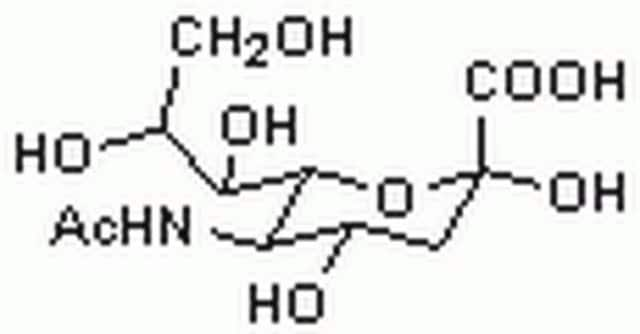A0812
N-Acetylneuraminic acid
≥95% anhydrous basis, synthetic
Synonym(s):
5-Acetamido-3,5-dideoxy-D-glycero-D-galactononulosonic acid, Lactaminic acid, NAN, NANA, Sialic acid
About This Item
Recommended Products
biological source
synthetic
Quality Level
type
Type IV-S
Assay
≥95% anhydrous basis
form
powder
color
white to off-white
mp
184-186 °C
solubility
H2O: ~50 mg/mL
storage temp.
−20°C
SMILES string
O[C@@]1(O[C@@]([C@@H]([C@H](C1)O)NC(C)=O)([H])[C@@H]([C@@H](CO)O)O)C(O)=O
InChI
1S/C11H19NO9/c1-4(14)12-7-5(15)2-11(20,10(18)19)21-9(7)8(17)6(16)3-13/h5-9,13,15-17,20H,2-3H2,1H3,(H,12,14)(H,18,19)/t5-,6+,7+,8+,9+,11-/m0/s1
InChI key
SQVRNKJHWKZAKO-PFQGKNLYSA-N
Looking for similar products? Visit Product Comparison Guide
Application
Biochem/physiol Actions
Other Notes
Signal Word
Warning
Hazard Statements
Precautionary Statements
Hazard Classifications
Eye Irrit. 2
Storage Class Code
11 - Combustible Solids
WGK
WGK 2
Flash Point(F)
Not applicable
Flash Point(C)
Not applicable
Personal Protective Equipment
Choose from one of the most recent versions:
Already Own This Product?
Find documentation for the products that you have recently purchased in the Document Library.
Customers Also Viewed
Our team of scientists has experience in all areas of research including Life Science, Material Science, Chemical Synthesis, Chromatography, Analytical and many others.
Contact Technical Service











